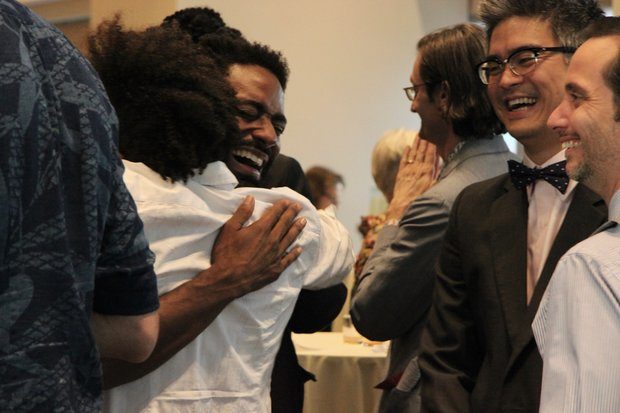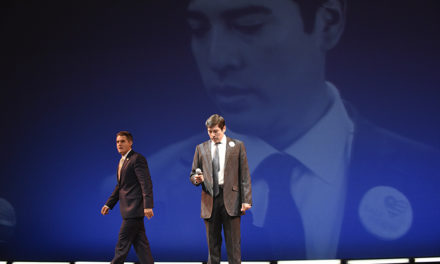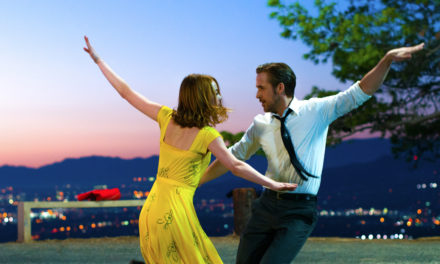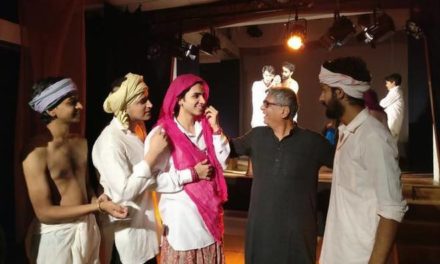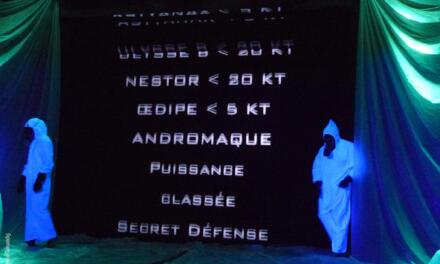On September 15, 2017, over 60 artists, administrators, educators, and other various stakeholders gathered at The Lark for the second Apothetae and Lark National Convening to discuss issues at the nexus of Disability and Theater. (Read about the first National Convening that happened in May 2015.)
The room was abuzz in the afterglow of the announcement of the inaugural fellow for the Apothetae and Lark Playwriting Fellowship which was awarded the evening before to Tim J. Lord. The Fellowship, the first of its kind, includes a two-year residency for a writer who identifies as Disabled, a cash award of $40,000, a $5,000 Opportunity Fund for project-related expenses, and control over a $10,000 Production Enhancement Fund. The Fellowship is made possible with leadership support from the Time Warner Foundation, with additional support from Jody Falco and Jeffrey Steinman. It also provides access to Lark and Apothetae resources, including artistic programs, rehearsal space, and staff support. Three finalists for the award, Oya Mae Duchess-Davis, Jerron Herman, and Magda Romanska, were also chosen to receive a $5,000 honorarium.
The Apothetae and Lark gathered members of various communities for energized dialogue exploring how the Theater field at large can further support and advocate for Disabled artists. The all-day event was broken up into four-panel discussions looking at Disability in Theater from the point of view of Artistic Directors, Educators/Artists, Directors, and Administrators focused on Production and Community Engagement.
The Lark is fully accessible, and Lauren Schechter provided CART services, also known as real-time captioning, to capture each conversation as it unfolded.
1. Artistic Directors
The first panel included artistic directors Regan Linton of Phamaly Theatre Company (Denver, CO), Jack Reuler of Mixed Blood Theatre (Minneapolis, MN), Nicholas Viselli of Theater Breaking Through Barriers (NYC, NY), and Gregg Mozgala of The Apothetae (NYC, NY). Each artistic director noted how their theater was filling gaps they identified in the theater landscape pertaining to opportunities for artists with disabilities. Advocacy plays a big part in their work as they strive to lift up plays by disabled writers, stories with content about disabilities, and casting that honors authenticity. A member from the audience explained that these stories are a matter of survival and announced to those who would erase the experiences of disabled people,“We are here. We exist.”
The artistic directors noted that in addition to helming their own initiatives, they also knock on the doors of larger theater institutions in an effort to cultivate partnerships. Such partnerships offer the potential to garner resources, continue to expand the visibility of the work, and shed light on the lack of disability awareness many larger organizations have historically allowed in their own programming and planning.
2. Education
The Education panel, which included Disability Studies Professor and Program Director of the Childhood Education Program at City College Jan Valle, Associate Director of Education and faculty member of The New York Conservatory for Dramatic Arts (NYCDA) Sara Buffamanti, and actor/writer Ryan Haddad, zeroed in on a number of challenges facing artists with disabilities hoping to pursue training for a career in the theater. They noted the limited number of students with disabilities admitted to professional training programs and the lack of recruitment of such students. Without access to training programs, artists with disabilities are put at a disadvantage as education opportunities often translate into advanced skills, experience, a robust resume, and connections in the industry. The conversation honed in on a necessary paradigm shift: What if educational institutions always anticipated a wide range of needs so that students with disabilities felt welcomed from the start rather than simply accommodated? “I have to be a better teacher. End of story.” Buffamanti elaborated. “I need to have such a mastery and understanding of my pedagogy at an essential level that regardless of the student I have in the room, I immediately have at my fingertips a myriad of ways to allow that student to entertain the experience of the exercise, or move towards the objective of what it is without necessarily thinking of it as an accommodation. And on the flip side of it, it makes me a better teacher. It makes me more present, more malleable, and more willing to go off script.”
3. Directors
The Directors panel included Sam Gold (The Glass Menagerie, Broadway), Evan Cummings (The Man Stanley, Walnut Street Theatre), Jo Bonney (Cost Of Living, Manhattan Theatre Club), and Moritz von Stuelpnagel (Teenage Dick, The Public Theater) and illuminated how directors are uniquely positioned to challenge audience expectations and cultural conventions in order to open up audiences to different approaches to casting. Directors have the power to shape the aesthetics of a piece and consider diversity and disability throughout the whole creative process starting from the initial vision of the show all the way to production. To better reflect the world in which we live, the panel suggested considering casting actors with disabilities in all roles, not just those specified as characters with disabilities. This requires directors in the field to be open to challenging their own expectations and procedures in casting processes. Many directors will often scan actor resumes looking for familiar names, meaty lead roles, and elite training programs. Fueled by the education discussion earlier in the day, the directors on this panel talked about the ways Disabled artists often face barriers in acquiring these traditional markers of success. How might directors find a new framework for engaging such actors in the casting room and allow those artists to expand their idea of what a role could be? They also discussed the need for theater institutions to be more welcoming to directors with disabilities by providing theater spaces, housing, and early-career apprenticeships that are accessible and available to all.
4. Production and Community Engagement
This panel addressed the question of how theaters focused on Disability can develop long-term relationships with larger theater organizations. Actor and Disability Advocate for Inclusion in the Arts Christine Bruno, Community Producer for Oregon Shakespeare Festival Claudia Alick, Company Dramaturg for The Public Theater Jesse Alick, and Associate Artistic Producer for Manhattan Theatre Club Steve Kaus discussed methods for sparking change within theater institutions. Some advocated for forcing organizations to change by applying public pressure while others suggested targeting key decision makers inside institutions who might wield their influence to prioritize disability discussions.
As The Apothetae and The Lark wrapped up the convening, the conversation centered around how to unite resources and turn reflections into action. Participants looked toward building upon and strengthening the network of artists, theater makers, advocates, and administrators who are deeply committed to this work across disciplines and inviting more people into the growing movement. There was a collective desire to share, celebrate, and push the work forward both in online spaces and in person. “The war is fought on many fronts,” Claudia Alick pointed out. “I believe in the power of artists and directors, and artists can change the landscape. But it’s fought in institutions, outside the institutions, fought in education. It’s all over the place. I think if everyone stays focused we won’t have the same conversation in five years, but that takes a network of people. People in the community and allies and everything to be all thinking as one, and moving things as one.”
5. What’s Next?
The fifth conversation didn’t happen at the convening but is the conversation we hope people will continue to have as a result of the gathering. Here are some of the actions steps convening participants walked away with at the end of the day:
Make Disability a part of every conversation your organization is having. Whether discussing season planning, hiring, or outreach strategies, consider what could make your organization more accessible and welcoming to all — structurally and programmatically.
Celebrate the successes. Exciting programming and initiatives around disability and theater are taking place in organizations across the country. Share those successes as widely as possible. And in that same vein…
Support the work. Go see a production, workshop, or reading that champions the voices and talents of artists with disabilities. Spread the word and bring a friend — or five.
Continue to connect. Many organizations are doing incredible work around disability in theater, and participants echoed the continued need to communicate what we are accomplishing with each other. A participant also pointed out that each person at the convening could be the entry point for someone else to join the conversation. Invite your friends and colleagues to discussions and performances focused on theater and disability.
This article was originally published on The Lark Blog. Reposted with permission. Read the original article.
This post was written by the author in their personal capacity.The opinions expressed in this article are the author’s own and do not reflect the view of The Theatre Times, their staff or collaborators.
This post was written by Megan McClain.
The views expressed here belong to the author and do not necessarily reflect our views and opinions.

